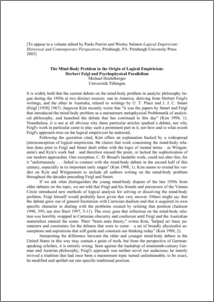Heidelberger, Michael
(2001)
The Mind-Body Problem in the Origin of Logical Empiricism: Herbert Feigl and Psychophysical Parallelism.
[Preprint]
![[img]](https://philsci-archive.pitt.edu/style/images/fileicons/application_pdf.png)  Preview |
|
PDF
Mind-Body_Theory_in_the_Origin_of_Logical_Empiricism.pdf
Download (204kB)
|
Abstract
It is widely held that the current debate on the mind-body problem in analytic philosophy began during the 1950s at two distinct sources: one in America, deriving from Herbert Feigl's writings, and the other in Australia, related to writings by U. T. Place and J. J. C. Smart. Nonetheless, it is not at all obvious why these particular articles sparked a debate, nor why Feigl's work in particular came to play such a prominent part in it, nor how and to what extent Feigl's approach rests on the logical empiricism he endorsed. Seen against the backdrop of nineteenth-century German and Austrian philosophy, Feigl's approach was neither novel nor audacious; he merely revived a tradition that had once been a mainstream topic turned unfashionable; to be exact, he modified and spelled out one specific traditional position. In order to understand Feigl's project, we need to first take a look at how the mind-body relation was discussed from mid-nineteenth century onward. Sections 1 and 2 of this chapter will deal with psychophysical parallelism, its popularity during the second half of the nineteenth century and how it was subsequently treated up to the late 1920s. My aim is to capture the setting in which young Herbert Feigl must have encountered the issue when he took up his university studies in Vienna in 1922. The third section deals with the special twist that Moritz Schlick and Rudolf Carnap gave the issue in their writings from that period. Finally, in the fourth section I analyze Feigl's fundamental essay "The 'Mental' and the 'Physical'"(1958) and discuss how it compares to positions he had advocated prior writing it.
Monthly Views for the past 3 years
Monthly Downloads for the past 3 years
Plum Analytics
Actions (login required)
 |
View Item |



